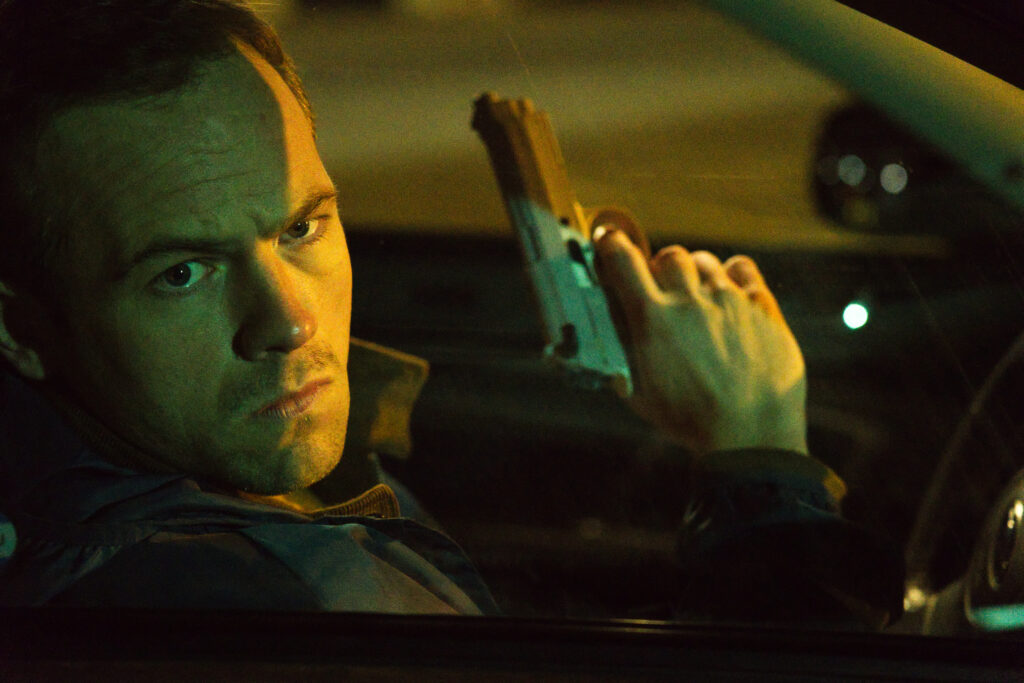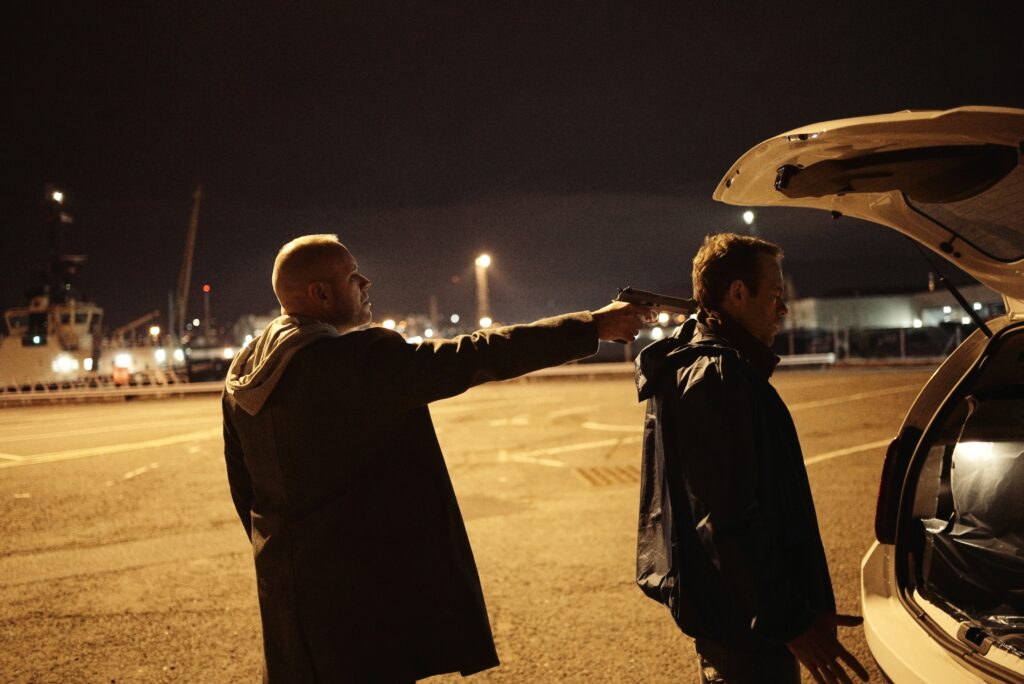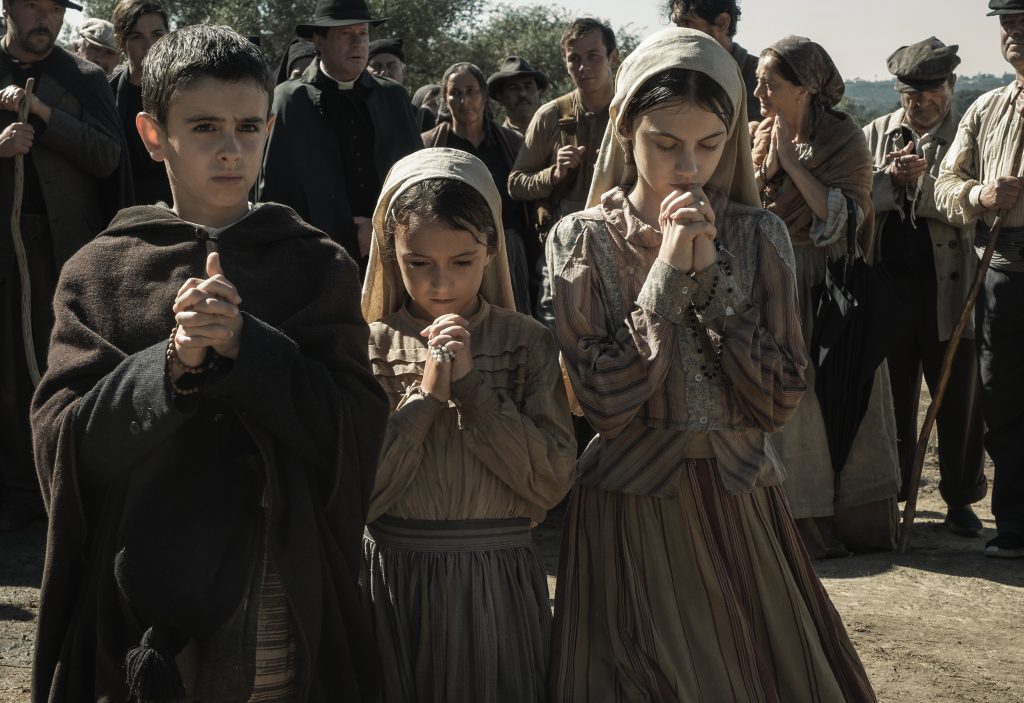May 13, 2022
by Carla Hay

Directed by Stephen Fingleton
Culture Representation: Taking place in Northern Ireland, the dramatic film “Nightride” features an all-white cast of characters representing the working-class, middle-class and criminal underground.
Culture Clash: A man who wants to leave his criminal lifestyle behind decides to do one last drug deal, but things go horribly wrong.
Culture Audience: “Nightride” will appeal primarily to people who like watching crime dramas with unusual settings, since “Nightride” takes place mostly in a car.

Not too many movies can make a lively thriller out of a story that’s mostly a series of phone calls, but “Nightride” succeeds in doing so. The movie overcomes some crime drama clichés with a riveting lead performance by Moe Dunford. Dunford is literally front and center for almost all of the movie’s screen time, which primarily features his “Nightride” character Budge talking on the phone, usually in his car. When Budge gets out of his car, it’s usually for a reason that adds to the tension in the story.
Directed by Stephen Fingleton and written by Ben Conway, “Nightride” takes place over the course of one night, somewhere in an unnamed urban part of Northern Ireland. Budge has been making money selling illegal drugs as a mid-level drug dealer, but he’s about to quit the drug trade to open a legitimate business with a good friend of his named Graham (voiced by Paul Kennedy), who is only heard in the movie through phone conversations. And yes, “Nightride” is one of those crime dramas were the protagonist wants to do “one last crime caper” before “going straight.”
Budge and Graham plan to open an auto body shop called Nightride Auto Body, which Budge describes as a place that will offer “bespoke” custom jobs. The two pals have a meeting scheduled to take place the next morning at a bank, to pay back £60,000 in cash that they owe on a bank loan to purchase the business. If Budge and Graham default on the loan, they lose all the money that has already been paid for the loan, and they’ll lose this chance to start the business. Graham’s parents mortgaged their house to help Budge and Graham as a business investment, so Graham feels extra pressure to make sure that this bank deal goes smoothly.
Budge plans to get the money by doing one last drug deal that will give him the cash that he and Graham need. Graham knows that Budge has been involved in criminal activities, but he has a “don’t ask, don’t tell” policy when it comes discussing it with Budge. All Graham knows is that Budge has promised him that no matter what happens that night, it will end with Graham getting the £60,000 in cash that they need. Budge has also promised Graham that it will be the last time he does anything criminal before they open their auto body shop.
Budge’s girlfriend Sofia (played by Joana Ribeiro), a Ukrainian immigrant, knows all of Budge’s plans, and she wants him to leave the criminal life behind too. Before Budge gets in his car to do the drug deal, Sofia tells him, “Don’t get lifted [slang for arrested]. Once you do this, you’ll be out. We’ll both be out.” Needless to say, Budge, Sofia and Graham are feeling very anxious, but Budge tries to hide his nervousness with a cool and confident manner.
They won’t be the only ones on edge about this drug deal. The plan is for two of Budge’s cohorts named Lefty (played by John Travers) and Beaker (played by “Nightride” director Fingleton) to pick up the drug supply in a van that has 50 kilograms of the drug. The name of the drug is not named in the movie. Lefty and Beaker are then supposed to drive the van to some Ukrainian gangsters, who will buy the drug supply, and give Budge’s henchmen the cash, which Lefty and Beaker they will hand over to Budge. Lefty and Beaker are supposed to get a pre-arranged cut of the cash as payment for their help.
And why isn’t Budge doing the delivery himself? He suspects that he’s under surveillance by law enforcement, so he doesn’t want to risk any chance of getting arrested. The gangsters who are buying this drug supply are led by a ruthless overlord named Felix (voiced by Andrew Simpson), who is already irritated with Budge because Budge has delayed this drug deal for a week. Felix says if the drug supply isn’t delivered by 11:15 p.m., the deal is off. At the time Felix tells Budge this deadline over the phone, it’s 10:40 p.m., and Felix think that’s enough time to get everything done. As a precaution, Felix sends a menacing goon named Troy (played by Gerard Jordan) to be his enforcer, in case things go wrong.
There would be no “Nightride” movie if things went smoothly. Lefty and Beaker are bumbling dimwits, so you know what that means. Other things go wrong too, but that information will not be revealed in this review. What can be mentioned is that the stakes keep getting higher for Budge. At one point, he has to choose whether or not to commit murder. Sofia begs him not to go to those deadly extremes, but will Budge listen to her pleas?
Other characters who get involved in one way or another in Budge’s drug deal gone wrong include a guy nicknamed Scholar (played by Ciaran Flynn), Budge’s middle-man accomplice who is a Ph.D. student dealing drugs to help pay for his school tuition; a man nicknamed Magic Shop (voiced by Desmond Eastwood), a drug buyer whom Budge turns to in a moment of desperation; and Joe (voiced by Stephen Rea), a loan shark who is described by someone as a “psycho.” Budge also has a 15-year-old female cousin nicknamed Cuz (played Ellie O’Halloran), who calls him at inconvenient times to talk about her love life, but she ends up giving some valuable help to Budge when things go awry. Cuz also wants to work at the auto body shop that Budge and Graham plan to own.
“Nightride,” which had its world premiere at the 2021 Toronto International Film Festival, was filmed in 2020 during the COVID-19 pandemic lockdowns and before COVID-19 vaccines were available. You can tell that the movie was filmed during the pandemic because most conversations take place over the phone, and most of the cast members are not seen in the movie. When any cast members are seen on screen together, they are not gathered in large groups; only two to four people are in the scene.
One of the best things about “Nightride” is how it makes great use of dialogue and facial expressions to give viewers important insight into the personalities of these characters. Budge is the type of character who will keep viewers curious about what he’s going to do next when another obstacle gets in his way. Things never get boring in “Nightride,” which is a testament to how this movie was filmed and edited, as well as the cast members’ performances, particularly the standout turn from Dunford. “Nightride” is not a completely groundbreaking film, but it has plenty to offer to viewers looking for an adrenaline-fueled and entertaining thriller.
Brainstorm Media released “Nightride” in select U.S. cinemas, digital and VOD on March 4, 2022.


